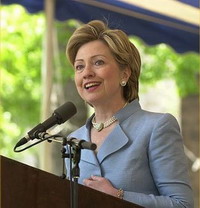2008 election in America is fight between change and experience
U.S. voters are torn between change and experience in 2008? They are demanding something new, but there is comfort in the tried and true.

The American public's low opinion of Washington and growing concern about the direction of the country point to 2008 being a "change" election, one like the campaigns of 1974 and 1992 when people looked for a marked departure from the status quo.
But the war in Iraq and the rise of global terrorism make for an anxious electorate and could turn this into a "war" election, one like the campaigns of 1944 and 2004 when voters found comfort in the most experienced candidates.
Change versus experience? The White House will likely go to the man or woman who speaks best to both.
"You can't separate them. I think (voters) want both," said John Edwards, the Democratic vice presidential nominee in 2004 who is running for president in 2008.
"I think they're looking for change - serious change, substantive change - and I think they will have to feel like whoever the candidate is is prepared to be president of the United States," Edwards said in an interview.
"I will say I don't think they will judge that based on a resume. I think that's a judgment they will make based on what they see and hear - the demeanor, personal strength (and) those kinds of things."
Edwards was quick to add that last part because he is more of a "change" candidate than one of experience. Despite this being his second national election, the former North Carolina trial lawyer has little in the way of a political resume outside a single term in the Senate.
Fellow Democrat Barack Obama also is more change than experience. Just three years removed from the Illinois Legislature, Obama rocketed to the top tier of the Democratic presidential race by presenting himself as an outsider who could transform government crippled by corruption, polarization and "a smallness of our politics."
"The time for that politics is over," Obama said when he announced his candidacy Feb. 10. "It's time to turn the page."
The message clearly resonates. The Illinois senator raised more money for the nomination fight than any other candidate while drawing huge crowds and an Internet following.
Obama's inexperience showed at an issues forum in Nevada when he had no answer for the nation's health care crisis. He looked worse at a debate when the Democratic candidates were asked how they would respond to another terrorist attack in the United States.
Obama should have been ready for that question. But all he could muster were a few halting sentences about effective disaster relief effort and "good intelligence." Democratic Sen. Hillary Rodham Clinton of New York pounced on his failure to consider a military action.
"I believe we should quickly respond," Clinton said.
The former first lady and second-term senator is long on experience and short on change. Polls show that most voters have made up their minds about her and they associate her with her husband's presidency - for better and worse.
A USA Today-Gallup Poll this month showed Clinton leading Obama among Democrats nationwide. The No. 1 reason Clinton's backers gave for their support was her experience. The main reason Obama's supporters backed him was "fresh face/has news ideas."
Still, both Democrats fight against type.
Clinton, 59, tries to be what Bill Clinton has called a "change agent." She denounces politics as usual, sponsors an edgy Internet contest and borrows phrases from Obama. "People are anxious to turn the page" and "change the direction of the country," she said this month.
Obama, 45, has started giving policy speeches. His wife addresses the not-ready-for-prime-time murmurs. "He has great experience," Michelle Obama told ABC this month. "He's been in the state Legislature. He's been a community organizer. He's been a civil rights attorney. ... Need I go on?"
Campaigning in New Hampshire, she said, "I know experience is important, right? But experience without the sort of moral compass is not enough."
On the Republican side, former Massachusetts Gov. Mitt Romney is a "change" candidate who casts himself as a Washington outsider.
Former New York Mayor Rudy Giuliani is an "experience" candidate who built his presidential platform around the attacks of Sept. 11, 2001. Terrorism, he says, is something "that I understand better than anyone who is running for president of the United States."
Republican Sen. John McCain was a self-styled reformer during his failed 2000 presidential campaign. His message this year is less about change than it is about courting conservatives - the Republican status quo. McCain, 70, considers his age and experience an attribute.
"I'm older than dirt and have more scars than Frankenstein," he likes to say. "But I've learned a few things along the way."
Subscribe to Pravda.Ru Telegram channel, Facebook, RSS!


